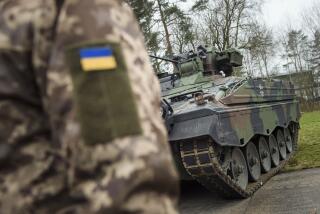Pressure Is On for Germany to Perform : Kohl needs to find a way to contribute militarily without causing alarm
- Share via
Late last year, after major NATO allies expressed their discontent over Germany’s lack of military help to the anti-Iraq coalition, Chancellor Helmut Kohl’s government offered a belated symbolic response. Germany said it was sending a number of its air force planes to Turkey. Unfortunately for the cause of amity within the alliance, the planes proved to be unarmed trainers that were incapable of combat operations. To make doubly sure that they would stay out of harm’s way, the planes were based at a field that left Iraq’s border well beyond their limited range. Germany’s allies were not impressed.
The Kohl government doesn’t want to be similarly embarrassed in the future. Neither does it believe that a democratic and unified Germany can go on pretending that it is anything less than a formidable presence on the world scene. Increasingly, Western Europe’s richest country is expected to take an international role more in keeping with its size and economic strength. Specifically, pressures are building for Germany to contribute more effectively to future international military operations.
Right now, by custom and constitutional interpretation, Germany’s armed forces can’t be deployed outside the NATO area. The only exception extends to participation as observers in small “blue helmet” U.N. peacekeeping units. Kohl thinks this must change. He will probably try to achieve that change by asking Parliament to pass a constitutional amendment this year. Getting the necessary two-thirds vote in the Bundestag won’t be easy, nor should it be. There are compelling historical reasons for suspicions about any projection of German military power. These must again be fully taken into account, by Germans and by their neighbors, so many of whom have been past victims of German aggression.
Kohl’s approach has the virtue of being respectful of historical memory. He will probably seek a change in the law that would allow German armed forces to be used outside the NATO area, but only as part of a joint international effort. That could be under the auspices of the United Nations, as the anti-Iraq coalition was. Or it could be within the framework of the Western European Union, should the security functions of that multinational organization ever be broadened.
This is about as cautious a move toward taking up international security responsibilities as anyone can ask for. That doesn’t guarantee its passage in the Bundestag. But by tying any German participation to much broader multilateral efforts, Kohl may have found the formula to effect constitutional change.
More to Read
Sign up for Essential California
The most important California stories and recommendations in your inbox every morning.
You may occasionally receive promotional content from the Los Angeles Times.













